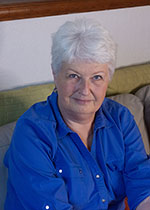 Malahat Review Fiction Board member and past interim editor Micaela Maftei talks with Rhonda Batchelor, who worked as Assistant Editor at The Malahat Review for 15 years, about her new book, Allow Me: Poems 2000-2020.
Malahat Review Fiction Board member and past interim editor Micaela Maftei talks with Rhonda Batchelor, who worked as Assistant Editor at The Malahat Review for 15 years, about her new book, Allow Me: Poems 2000-2020.
MM: One key theme that I see running through the collection is that of acceptance, or of seeing things as they are instead of how one might like them to be. I feel we can maybe best see this in a poem like “Room,” for instance, which closes the collection. Would you say that adapting to change, or coping with surprise (good or bad) is something you think about? It seems many of the poems trace what is left behind in the wake of different kinds of departures and how time can feel like it starts and stops depending on our circumstances. Can you talk a bit about these themes?
RB: I find it intriguing (since I felt the book was such a miscellany) that you’re not the only one to perceive these threads. One of the cover blurbs says “the voice in this book is ultimately resilient” and another that the book is an “eyes-cracked meditation on time.” I’m flattered, but these weren’t things I consciously set out to accomplish! I think anyone who’s reached middle age (or older) has had to be resilient. I don’t think it’s a unique trait. We’re all faced with challenges—some of us more than others, be they physical, emotional, mental, financial, what have you, and for the most part we find ways of adapting, of coping. In the poem “Evelyn” I write about my mother’s dementia: “When my mother grew old, her mind grew young.” It’s not uncommon that people with dementia or Alzheimer’s retreat to the past. Apart from any medical aspect, I completely understand this from an aging poet’s stance. “I pine for the time / when I knew everything. / It was long ago, and spring—/ when the stars aligned and / I belonged. …” (“Once”) In a way, the poem “Room,” which you mentioned, was also about dementia. It was based on a dream of checking into a hotel having systematically lost my luggage, my money, my passport—in essence, my identity. It should have been a frightening scenario, and yet there was something comforting in having one’s circumstances reduced to a room where you are, at least for the time being, safe. Acceptance as resiliency? Maybe.
Read the rest of Rhonda Batchelor's interview.
 Malahat Review volunteer and recent contributor Carlee Bouillon talks with Rebecca Păpucaru, one of two judges for our 2022 Novella Prize contest.
Malahat Review volunteer and recent contributor Carlee Bouillon talks with Rebecca Păpucaru, one of two judges for our 2022 Novella Prize contest.
CB: Everyone has a slightly different idea of what makes a good story into a story you can’t forget—that’s what makes writers unique to each other. So what are you looking for in a winning entry? Is there anything in particular that you are hoping to see?
RP: I want a story to feel authentic, even if it's pure fantasy. I want it to feel necessary, as if it had to be told, but that doesn’t mean the subject has to be earth-shattering. I want to feel I'm in the hands of a writer who understands the novella form, the chance it offers to explore a character in depth. Ultimately, I want, as Nabokov said, to feel that the writer has arrived at their point, “by diminishing large things and enlarging small ones.”
Read the rest of Rebecca Păpucaru's interview.